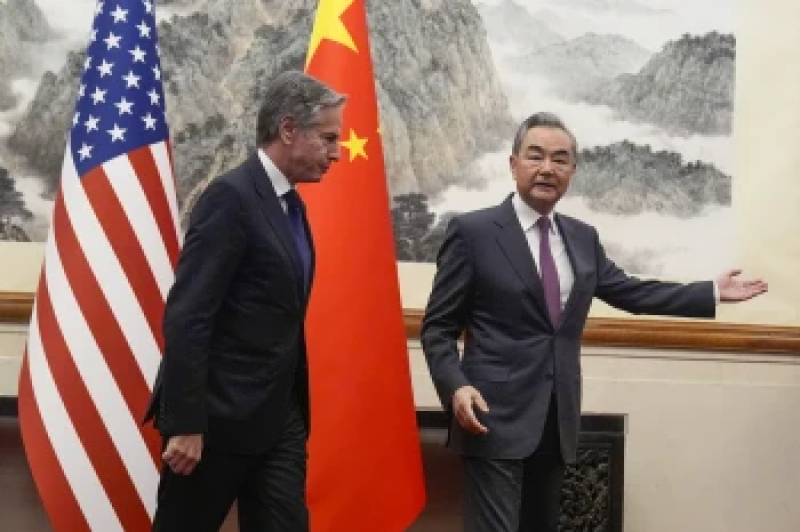- Stock market: DSE fails to sustain early gains, CSE extends rally |
- Illegal arms, disinformation pose major challenges to BD polls: Officials |
- BNP senses ‘dangerous conspiracy’ against democratic transition |
- CEC Vows Credible Election to End Stigma |
- High-level meeting reviews country’s economic progress |
US-China talks start: Caution about Misunderstandings, miscalculations

Chinese Foreign Minister Wang Yi, right, gestures to U.S. Secretary of State Antony Blinken at the Diaoyutai State Guesthouse, Friday, April 26, 2024, in Beijing, China. (AP Photo-Mark Schiefelbein, Pool)
BEIJING, Apr 26 (AP/UNB) — The United States and China butted heads over a number of contentious bilateral, regional and global issues as U.S. Secretary of State Antony Blinken met Friday with Chinese Foreign Minister Wang Yi.
Both diplomats underscored the importance of keeping lines of communication open but they each lamented that divisions between their countries were increasing and becoming more serious in nature.
“Overall, the China-U.S. relationship is beginning to stabilize across the areas,” Wang told Blinken. “But at the time, the negative factors in the relationship are still increasing and building and the relationship is facing all kinds of disruptions.”
“Should China and the United States keep to the right direction of moving forward with stability or return to a downward spiral?” he asked. “This is a major question before our two countries and tests our sincerity and ability.”
Wang also outlined, without being specific, well-known Chinese complaints about U.S. policies and positions on the South China Sea, Taiwan, human rights and China's right to conduct relations with countries it deems fit.
“China’s legitimate development rights have been unreasonably suppressed and our core interests are facing challenges,” he said, demanding the U.S. refrain from interfering in China's internal affairs.
Blinken responded by saying that the Biden administration places a premium on U.S.-China dialogue even on issues of dispute and noted that there has been some progress on bridging divisions in the past year. Still, he suggested that the discussions would be difficult.
“I look forward to these discussions being very clear, very direct about the areas where we have differences and where the United States stands, and I have no doubt you will do the same on behalf of China,” Blinken told Wang.
“There is no substitute in our judgement for face-to-face diplomacy in order to try to move forward, but also to make sure we’re as clear as possible about the areas where we have differences at the very least to avoid misunderstandings, to avoid miscalculations," he said.
Blinken arrived in China on Wednesday, visiting Shanghai shortly before U.S. President Joe Biden signed a $95 billion foreign aid package that has several elements likely to anger Beijing, including $8 billion to counter China’s growing aggressiveness toward Taiwan and in the South China Sea. It also seeks to force TikTok’s China-based parent company to sell the social media platform.
China has railed against U.S. assistance to Taiwan and immediately condemned the aid as a dangerous provocation. It also strongly opposes efforts to force TikTok’s sale.
Still, the fact that Blinken made the trip — shortly after a conversation between Biden and Xi, a visit to China by Treasury Secretary Janet Yellen, and a call between the U.S. and Chinese defense chiefs — is a sign the two sides are at least willing to discuss their differences.

